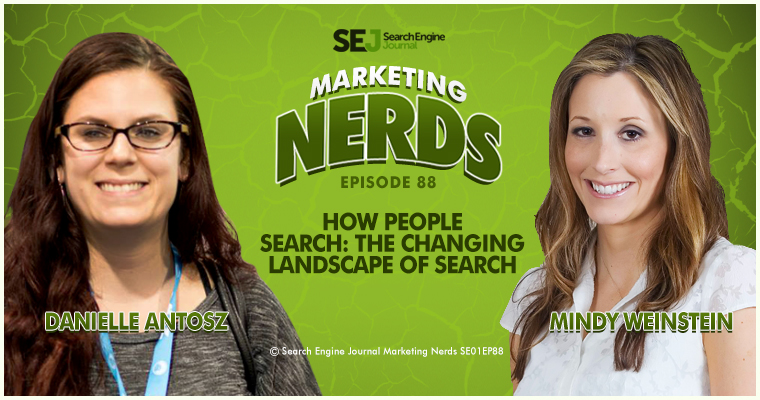Podcast: Download
Subscribe: Apple Podcast Google Podcasts Spotify
Visit our Marketing Nerds archive to listen to other Marketing Nerds podcasts!
In this episode of Marketing Nerds, Mindy Weinstein of Bruce Clay Inc. joins Features Editor Danielle Antosz to talk about the changing landscape of search. Mindy shares how to people search nowadays, as well as how search engines have evolved to accommodate those changes.

Here are a few transcribed excerpts from their discussion, but make sure to listen to the podcast to hear everything:
How People Search Nowadays
When we go to Google and do a search, especially if we’re doing it on our phone, a lot of times we’re talking into our phone, and it’s going to be a completely different search versus us sitting at our desktop and typing in the words.
Most people don’t even know that things are shifted. When you’re working with clients, and you’re working with businesses, they don’t necessarily understand that SEO’s not like it used to be.
People in some countries don’t even have computers. I know for myself, a lot of times if I am sitting on the couch and I have access to my laptop or access to my phone and I could reach for either one, I’m still going to pick up my phone to do a search.
Where things have shifted is that it’s not just those keyword phrases that we’re going after, like “Phoenix weather.” Instead, I’m going to do a search that says, “What is the weather in Phoenix?” because it’s our language, it’s the way we talk, and that’s really where the trend is going. It’s been going that direction and it’s going to continue to go that direction.
Understanding How Today’s Generation Searches on the Web
We also have different generations that are coming up and doing searches. You think about more searches that they’re doing, their generation, everything you could need is going to be found online.
You have to think about: what is the behavior? Often, you see it right in front of you; we just don’t always translate that into marketing.
We think people still behave a certain way with what we think they’re supposed to do with how they search, when right in front of us, we can see examples of what’s natural. What are people doing nowadays? An evolution, and like I said, we’re going to continue to see it change.
The Evolution of Search Engines
In our industry, we know what the search engines tell us, and, of course, we know the biggest one that comes to mind when we talk about search engines and accommodating all of this. I think about Google and I think about the Hummingbird algorithm.
To accommodate the future of voice search and mobile, Google was anticipating that people would be talking. When we’re talking, we’re more likely to ask a question, and then you ask follow-up questions in your search. When you do your follow-up question, you might even leave out the location. “Is there a restaurant near there?”
The search engines, their algorithms, they have to accommodate that, so they have to accommodate the natural search language.
Plus, there’s the whole talk about artificial intelligence. I think that’s playing a factor, too, of understanding conversations and intent and behavior. What do we mean when we search?
The search engines want to give us relevant results, whether it’s typing it on your laptop or talking into your phone, they want it to be a good experience for you. They’ve definitely got the technology now, and I think it’s just going to continue to evolve as time goes on.
Missing Link Between Search Engines and Users
One of the things I see often is businesses that are still practicing old school SEO—or the people working for them still are. They aren’t as ingrained in it as we are, so they know in the past that the way to get your website to show up in search results is you pick this particular keyword and you optimize your page for that, you go out and you try to attract links. They’re the things that are somewhat correct, but they haven’t taken it to the advanced step.
Where they miss the mark is they don’t think about what questions are people going to ask. What are some of the ways my customers or my clients describe their problems or their needs? They know that from a marketing perspective, but they don’t seem to marry the two together.
Let’s take that language they’re using, that behavior, things that they care about, and let’s craft the right message on our website. That’s SEO. It’s marketing. It’s also content. It’s all the things together.
Are SEO and Search the Same Thing?
With search, I look at the whole picture of search encompasses a lot more.
Going back to SEO, it is technical. There is no doubt that it’s technical, because all the things that we do to get a website to be ranked and to get traffic.
From the SEM side, we can do social media, we can do pay-per-click, we can do a lot of things, but if we don’t have the right foundation for our website, so there are technical problems.
There’s huge technical aspect of SEO. There’s also a marketing aspect of SEO. To optimize that website, you’re thinking about the words and the phrases and all the things I’ve been talking about; you have to know the audience. Then, that’s where you go into the marketing side. It’s definitely a lot that goes into it.
To listen to this Marketing Nerds Podcast with Danielle Antosz & Mindy Weinstein:
- Listen to the full episode at the top of this post
- Subscribe via iTunes
- Sign up on IFTTT to receive an email whenever the Marketing Nerds podcast RSS feed has a new episode
- Listen on Stitcher
Think you have what it takes to be a Marketing Nerd? If so, message Kelsey Jones on Twitter, or email her at kelsey [at] searchenginejournal.com.
Visit our Marketing Nerds archive to listen to other Marketing Nerds podcasts!
Image Credits
Featured Image: Image by Paulo Bobita
In-post Photo: d8nn/Shutterstock.com





![AI Overviews: We Reverse-Engineered Them So You Don't Have To [+ What You Need To Do Next]](https://www.searchenginejournal.com/wp-content/uploads/2025/04/sidebar1x-455.png)